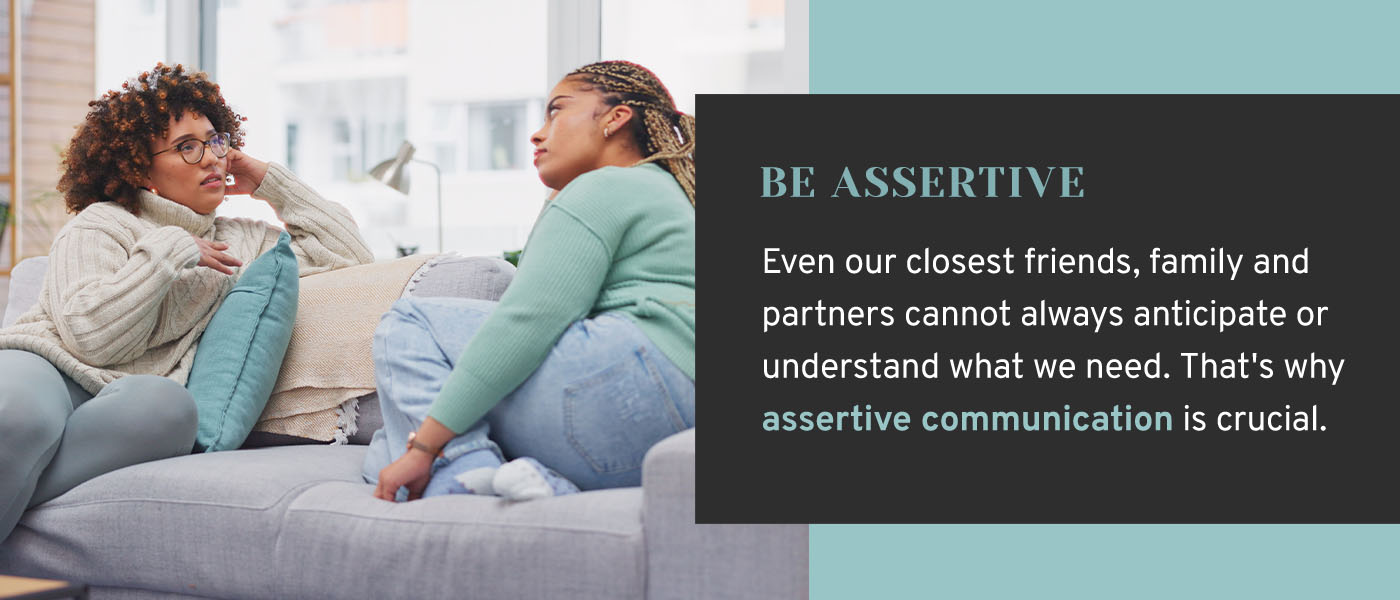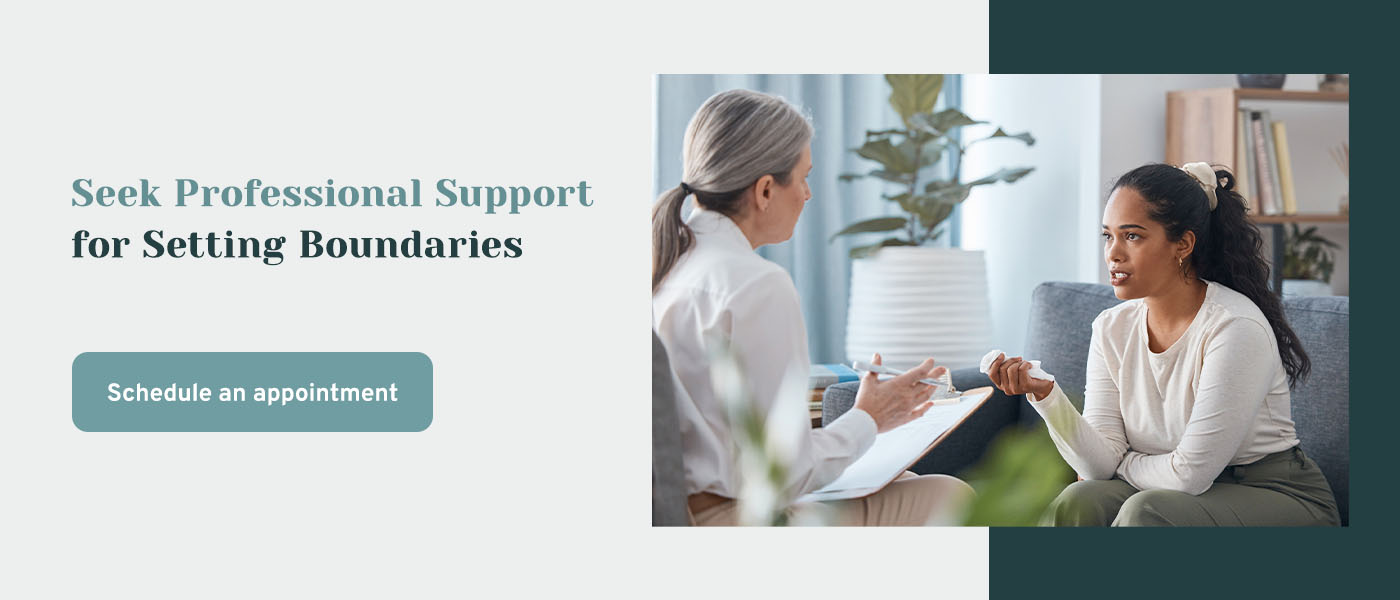Knowing how to set boundaries is a crucial life skill. Having personal and emotional boundaries in places helps you identify and communicate your needs effectively. It also ensures that others respect your values, helping you create healthier and happier relationships. While it can be challenging to develop boundaries and actually enforce them, with a little practice, you can ensure they are never broken.
Here’s what it means to have personal boundaries and how to enforce them in your life.
Table of Contents
- What Are Boundaries?
- 6 Tips for Setting and Maintaining Healthy Boundaries
- Seek Professional Support for Setting Boundaries
What Are Boundaries?
A boundary is a limit you set for yourself within a relationship that defines what you will or will not allow. Boundaries are set for yourself, not for others. Ultimately, they represent what you need for your growth or to protect yourself from harm, typically involving other people.
People with strong boundaries make their expectations clear in two ways — establishing what behavior they will accept and what behavior other people can expect from them. Healthy boundaries might look like sharing the appropriate amount of personal information with another person, understanding your individual needs and how to communicate them, and valuing your own opinions. It also means accepting when others tell you “no.”
Your boundaries can be influenced by your culture or the specific situation. For instance, some cultures might find that sharing personal information isn’t appropriate at any time, while others might encourage sharing at all times. People might also have different types of boundaries — such as stricter boundaries at work and looser ones for friends and family members.
6 Tips for Setting and Maintaining Healthy Boundaries
Setting strong boundaries can prevent you from being taken advantage of or treated poorly. Enforcing them allows you to foster healthier relationships and lead a more satisfying and fulfilling life. Here’s how to set personal boundaries with family members, partners, friends, co-workers or strangers you encounter in life.
1. Practice Self-Awareness
Self-awareness is critical to identifying and setting boundaries. To start, examine your past and present experiences and acknowledge what might have caused discomfort, frustration, resentment or other unwanted feelings. Once you establish the people, places or situations that might cause these feelings, you can take action toward creating and communicating boundaries associated with them.
Understand that boundaries are set on you and not on others. Rather than listing what others must do, phrase your boundaries as what you will or will not allow. Practicing self-awareness and identifying these patterns with others can help you effectively enforce your limits. And since our boundaries can shift over time based on changes in life or relationships, being self-aware enables you to notice changes and adjust boundaries as needed.
2. Start Slow and Be Realistic

It’s important to start slow when enforcing boundaries. Doing so allows you to move at a comfortable pace and will enable you to reflect on whether you are headed in the right direction. Set realistic consequences before a boundary is violated, and be prepared if people respond poorly at first. Those who are controlling, manipulative or have unhealthy boundaries themselves might be triggered when you set a limit.
With daily practice and repetition, you can gradually enforce your boundaries. While some people might have been unaware of your feelings and will be willing to support you, others might react negatively since they feel as though you are withdrawing support. If you’ve promised to remove a privilege if they break a boundary, follow through. Remember that you are worth it, and only those who respect your decision are those who truly deserve your time.
3. Be Assertive
Even our closest friends, family and partners cannot always anticipate or understand what we need. That’s why assertive communication is crucial. Practicing it means effectively, clearly and respectfully communicating your thoughts, wants and needs with others.
For example, let’s say your roommate lets their dishes pile up in the sink. Instead of harboring resentment toward their behavior, clearly communicate why you are upset and discuss potential changes that could improve the situation.
Similarly, if you feel as though your boss is taking advantage of your work ethic, ask for them to clarify their expectations while communicating your boundaries. This way, everyone is on the same page and you can enforce your needs.
4. Remain Clear, Concise and Consistent
It’s essential to be clear and consistent when conveying your boundaries. Communicate your needs clearly and keep it short and sweet. Adding unnecessary explanations or filler words can leave room for negotiation or guilt-tripping that could cause you to change your mind. Over time, people will learn that you mean what you say without room for interpretation.
It’s also essential to communicate your boundaries right away. This ensures people know where you stand, which will lessen feelings of hurt or confusion later. By being upfront, clear and consistent, you reinforce your beliefs and limits and ensure those lines remain clearly defined.
5. Practice Self-Love
For emotional boundaries to have a solid foundation, it’s essential to practice self-love. If you have a positive narrative about yourself, you will find it easier to set limits to protect yourself. Self-worth and self-value are crucial components of maintaining boundaries.
Engage in activities that make you feel good, whether that means working out, singing or participating in a hobby you like. Anything that releases feel-good hormones can encourage a healthier mindset. Prioritizing yourself can help you change your internal dialogue and make you feel more deserving of the boundaries you set.
6. End Toxic Relationships
When establishing boundaries, think about them as a way to weed out harmful or toxic relationships. If a person truly values and respects you, they will support your boundaries. If they refuse, you know all you need about what the future might hold if you stay in the relationship. So, trust your gut and reconsider toxic relationships that fail to acknowledge your boundaries.
Seek Professional Support for Setting Boundaries
Setting boundaries can be challenging, but know that you are worth it. Boundaries are crucial to healthier relationships and self-protection. If you ever feel like you are being taken advantage of, are unhappy or have lost all sense of self, think about whether you need strong boundaries in place.
If you struggle to establish and enforce personal boundaries, seek professional support. At Taylor Counseling Group, we can help you take those first steps while also helping you implement your boundaries. Our counseling services can help you deal with unhealthy relationships, depression, anxiety and other life stressors.
With our affordable and accessible care in Central Texas, we can address your unique needs for a more rewarding future. To start your journey toward better mental health, schedule an appointment with us today.






